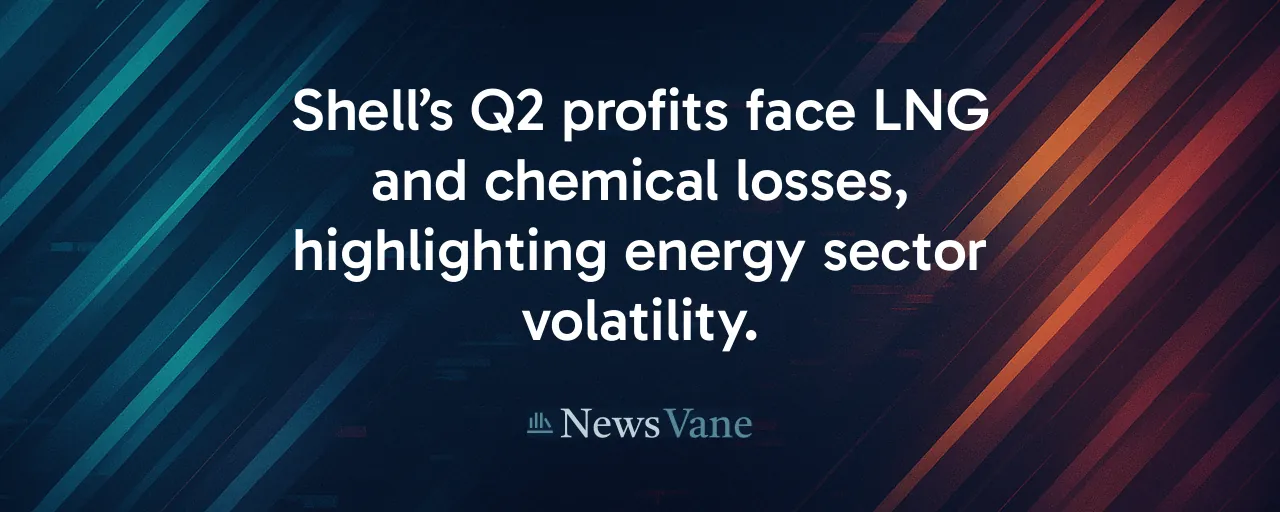A Jolt From Shell's Earnings
Shell plc, one of the world's energy giants, sent ripples through financial markets with its July 2025 pre-earnings update. The company warned that its second-quarter profits, due for release on July 31, will take a hit from weaker liquefied natural gas (LNG) trading and ongoing losses in its chemicals division. This news, detailed in a regulatory filing, shaved roughly three percent off Shell's share price on the London Stock Exchange, signaling investor unease. The announcement opens a broader conversation, one that transcends the company's balance sheet.
At stake is the delicate balance between maintaining energy security, delivering shareholder value, and addressing global climate pressures. Shell's update highlights the volatility of fossil fuel markets, where trading profits can swing wildly based on weather or geopolitics. Meanwhile, the chemicals segment's struggles point to deeper structural issues in petrochemicals. These challenges affect investors, employees, governments, and communities near Shell's operations.
The energy sector stands at a crossroads. Shell's diversified portfolio, spanning gas, refining, and renewables, reflects the industry's broader attempt to navigate a transition to cleaner energy. The moment calls for companies and policymakers to align profitability with long-term sustainability, ensuring reliable energy without locking in decades of carbon emissions.
Unpacking the Numbers
Shell's Integrated Gas division, a cornerstone of its business, expects production of 900,000 to 940,000 barrels of oil equivalent per day in Q2 2025, with LNG liquefaction between 6.4 and 6.8 million tonnes. Trading profits in this segment are projected to be significantly lower than the previous quarter. Industry reports attribute this to narrowing price spreads, as European gas storage hit 60 percent capacity by June and Asian spot prices dropped below $7 per million British thermal units.
The Chemicals and Products segment faces its own hurdles. Despite chemical margins rising to about $166 per tonne, utilisation rates slumped to around 72 percent due to unplanned downtime. Adjusted earnings in this division remain negative, reflecting a global oversupply in petrochemicals, particularly polyethylene, which analysts predict will persist through 2026. Refining offers a bright spot, with utilisation rates of 92 to 96 percent and margins climbing to $9 per barrel, bolstering cash flow.
These figures reveal a complex reality. Shell's ability to generate cash from refining cushions the blow from trading and chemicals, but the company's long-term stability hinges on addressing structural weaknesses. The data highlights the need for strategic investments that balance immediate returns with future resilience.
Voices in the Energy Debate
Stakeholders across the spectrum are weighing in. Shareholders, focused on dividends and buybacks, view LNG as a reliable cash engine despite temporary dips. Shell's trading arm, historically a profit powerhouse, has delivered $1 to $2 billion quarterly earnings for a decade. Advocates for faster decarbonization argue that volatile fossil fuel profits highlight the urgency of scaling renewables. They point to chemicals' environmental footprint, noting air-quality concerns near petrochemical plants.
Governments face their own dilemmas. Tax revenues from Shell's operations fund public services, but rising climate litigation and emissions regulations increase compliance costs. Local communities near refineries and gas hubs worry about job security and safety, while industrial customers rely on steady LNG and fuel supplies. Each group seeks stability, but their priorities often clash, complicating the path to consensus.
Lessons From the Past
Shell's current challenges echo historical patterns. In Q2 2022, the company posted record earnings amid a gas price surge following Russia's invasion of Ukraine, showcasing the boom-and-bust nature of energy markets. The chemicals division has struggled since the 2020 pandemic slashed demand, a reminder of petrochemicals' vulnerability to global economic shifts. Under CEO Wael Sawan, Shell's 2023 strategy reset prioritized shareholder returns and selective divestitures, such as its Nigerian onshore assets, to streamline operations.
These shifts reflect broader industry trends. Energy companies have long grappled with balancing hydrocarbon dominance against growing pressure for low-carbon investments. Historical data suggests diversified portfolios can weather short-term volatility, but prolonged losses in any segment, like chemicals, risk asset impairments or closures, with ripple effects on jobs and local economies.
Balancing Profit and Planet
Shell's diversified model offers a framework for navigating these tensions. LNG remains critical for energy security, particularly in Europe and Asia, where it supports winter heating and industrial needs. Long-term demand depends on policies that incentivize carbon capture or hydrogen to curb emissions. The chemicals segment, while struggling, could pivot toward bio-based materials or recycling, aligning with circular economy goals and preserving jobs.
Policymakers play a pivotal role. Stable tax frameworks and investment credits for low-carbon technologies could bridge the gap between profitability and sustainability. Labor unions and management might collaborate on reskilling programs, preparing workers for roles in renewable fuels or green chemistry. Such compromises prioritize practical outcomes over ideological battles, ensuring energy reliability while advancing climate objectives.
A Roadmap for Stability
Shell's Q2 2025 update serves as a wake-up call for the company and the broader energy sector. Volatility in LNG trading and persistent chemicals losses highlight the risks of over-reliance on fossil fuels, refining's strength shows hydrocarbons remain vital for now. The solution lies in disciplined capital allocation, directing cash flow to both maintain core operations and scale low-carbon projects once debt targets are met.
Collaboration is key. Governments, companies, and communities need to align on policies that reward innovation without destabilizing energy markets. For Shell, this means integrating its recent acquisition of Pavilion Energy's LNG portfolio while investing in technologies like carbon capture. For society, it means fostering an energy system that delivers affordability, security, and sustainability.
The road ahead is complex, but Shell's challenges offer a chance to rethink energy's future. By prioritizing resilience and adaptability, stakeholders can build a system that serves investors, workers, and the planet. The question is whether they can act swiftly enough to turn potential into progress.
